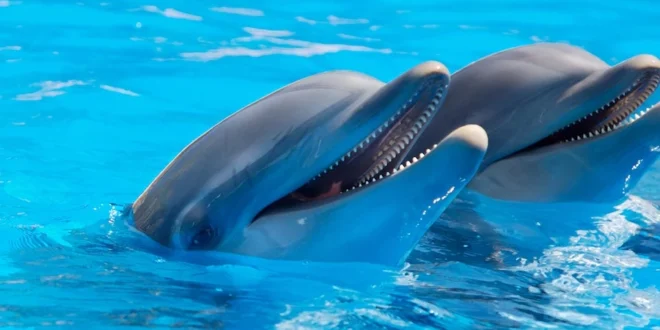It is common for people to ask, why do dolphins like humans? Especially when touring a dolphin entertainment center.
Dolphins are regarded as one of the most captivating creatures in the ocean, known for their high intelligence level and playful behavior. One of the intriguing aspects of dolphin behavior is their high affinity towards humans.
While these interactions can be so exciting for humans, they do raise the alarm as to why they are so attracted to us in the first place.
We shall look at the reasons behind dolphins’ high affinity to humans and shed light on the social behavior of these marine mammals.
So, Why Do Dolphins Like Humans?
There are several reasons behind dolphins’ attraction to humans. One being humans are associated with positive interactions such as feeding and play. Furthermore, research indicates that dolphins like humans since they perceive them as potential allies.
Even though dolphins enjoy human interaction, they can still be dangerous. Therefore, it is essential to approach dolphins with caution.
A Brief Overview Of Dolphins Social Behavior
Dolphins are highly social animals in that they live in groups called pods consisting of a few to hundreds of them.
They are well recognized for their complex communication systems involving a variety of vocalization, body language, and touch.
Dolphins can form stronger bonds with members of their species, displaying exquisite behaviors such as synchronized swimming.
There are rare cases of dolphin aggression towards one another unless resources are scarce and they must compete.
Moreover, dolphins develop their signature whistle as they grow up, allowing them to identify themselves and their fellow dolphins. Dolphins communicate through different sounds, like whistles and squeaks.
A research biologist Joseph Bruck experimented to examine whether dolphins can remember each other. He exposed dolphins to the signature whistles of other dolphins they had previously contacted.
When the dolphins heard the signature whistles of their friends, they reacted with joy, trying to search for the sound source.
The experiment exposed the ability of dolphins to recognize their friends and display an emotional reaction proving there are social animals.
Reasons For Dolphin Interaction With Humans
There is a plethora of reasons why dolphins love to interact with humans. They include:
1. Natural Curiosity And Playfulness
One of the major reasons why dolphins love to interact with humans has to boil down to their natural curiosity and playfulness.
Dolphins are highly intelligent animals that are very inquisitive in nature and love interacting with interesting objects which humans tend to have.
Their interactions with humans can foster anything from chasing speed boats to playing with balls.
2. Positive Experiences
Dolphins may love interacting with humans due to the positive experiences they get from being allies with man. Some positive experiences dolphins get from humans include regular feeding and playfulness.
Since dolphins are emotional beings, they enjoy the time and attention humans dedicate to being around and playing with them.
3. Mutual Protection
Dolphins might also love interacting with humans since they view man as a potential ally or protector. In the past, many have witnessed dolphins approaching humans in distress, seeking help and protection from predators like sharks.
In April 2014, a swimmer named Adam Walker was offered protection by a pod of dolphins as he did an 84-hour endurance swim. The dolphins did so as they noticed a shark trailing behind Adam.
A pod of dolphins assisted a local Philippine fisherman from drowning in 2008 after his boat capsized in a storm.
Furthermore, a group of divers lost in the red sea for over 13 hours was rescued by a dolphin in 2004. The dolphins led the rescue team to their location.
The existence of mutual protection between dolphins and humans is a valid reason why they love interacting with us.
4. Similarities In Personality Traits
Dolphins have several personality traits similar to humans, despite having evolved in a different environmental setting.
A research study published in the Journal of comparative psychology investigated the personality traits of 134 male and female dolphins from eight different facilities. The study reasoned that intelligence is a large contributor to personality traits.
Therefore, humans and dolphins might be allies since their share some common personality traits resulting from their intelligence.
5. Communication
Since dolphins are highly social animals and use various communication methods, they may view humans as potential communication partners. It may be a reason why dolphins might want to interact with humans.
Dolphins have been seen trying to communicate and understand humans in different captivities and beaches. They even adequately responded to certain responses as they played with humans.
6. Mutual Benefits
Interaction between humans and dolphins can be mutually beneficial, with dolphins providing entertainment for rewards such as food.
This phenomenon is vastly portrayed in captive dolphins, which provide humans with good entertainment to get food.
Risks And Challenges Of Human Interaction With Dolphins
While the interaction between dolphins and humans might look safe and enjoyable, it can still harm both parties. Here are some of the ways human and dolphin interaction can prove to be dangerous:
Disruption Of Behavior
Interaction between humans and dolphins can dramatically disrupt dolphin behaviors affecting its eating patterns and potentially causing harm. Dolphins are wild animals, and they like their habitat as much as we do.
Taking dolphins captive can disrupt their freedom, making them aggressive in return. Aggression can influence it to trigger an attack on humans. A 10-year-old British girl was attacked swimming with a dolphin.
The dolphin bit and dragged her underwater. Although she survived the attack, she had several bite marks, bruises, and cuts. Even if dolphins are friendly to humans, it is good to respect their space as it is difficult to predict their actions.
Sexual Aggression
Since dolphins and humans have been seen to share some common personality traits, some dolphins might develop a sexual desire for humans. In some situations, the situation can get aggressive and even out of hand.
People who work in areas where dolphins have been held in captivity have reported that some dolphins tried to approach them sexually. In one case, a man named Malcolm Brener was sexually pursued by a female dolphin.
In another case, an ocean videographer named Michael Meyers was pursued by a male dolphin pushing him to the bottom of the ocean. However, he could handle the situation as an experienced scuba diver
Regular scuba divers might not have known what to do and ended up fighting back. Fighting back can trigger aggression from the dolphin, which might lead to the scuba diver getting hurt and potentially losing their oxygen flow.
Fatal Dolphin Attack
Even if a dolphin loves and enjoys human interaction, it doesn’t mean it cannot hurt or even kill a human.
In Sao Paulo, Brazil the year 1994, two drunk men heard the idea that dolphins are friendly and thought it would be fun to head to a dolphin they had seen on Caragua beach.
The two men, Zhao Paulo and Wilson Rhys got repeatedly head-butted by the dolphin after their failed attempt to ride it. The head butts were vicious, leaving the two men sustaining broken ribs.
Rhys’ injuries were fatal, causing massive bleeding that resulted in his death a few days after the attack. One may argue that it was a wild dolphin and that those in captivity could never kill a human.
Well, it turns out that is not the case, and in fact, the captive ones have done more harm to humans. Tillicum was an orca dolphin that performed in the sea world of Orlando.
The dolphin was responsible for the death of two trainers and a man that snuck into his pool between 1994 and 2010. Dolphins are rarely human aggressive but might respond unexpectedly if you cause pain and discomfort.
Risk Of Disease Transmission
While dolphins are not known to carry any diseases, their interaction with humans can lead to the transmission of diseases.
For a long time, humans have been known to dump their waste in the ocean, which is the prime home of dolphins.
Waste of water can lead to the growth of harmful bacteria in the sea. As dolphins swim through these waters, they might carry this bacteria. As humans interact with these dolphins, they can get sick and potentially die if not treated.
Stress And Anxiety
Human interactions with dolphins can cause stress and anxiety, affecting their physical and emotional well-being.
Additionally, the experiments were done on dolphins to better understand they might leave them more aggressive toward humans.
Additionally, dolphins are social animals and do not like being separated from their pods. It might leave them feeling lonely, generally affecting their behaviors.
Conclusion
The relationship between dolphins is fascinating and complex, driven by different factors such as natural curiosity and mutual benefits.
While interacting with dolphins can be enjoyable and exciting for humans, it is crucial to remember that they are wild animals and unpredictable. Therefore, cautiously approaching them is necessary to avoid upsetting them.
Continuous study of human and dolphin interaction is critical for a better understanding of the behaviors of dolphins.
 Being Human
Being Human




